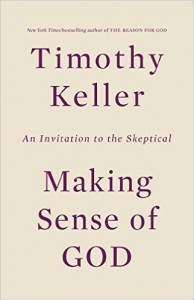
What do you want from life? What brings a satisfaction that lasts?
Wealth, power, sex?
The correct candidate winning today’s election? (I am sure this hits a nerve with a large number of readers.)
Life, liberty, and the pursuit of happiness?
Tim Keller digs into the question of a satisfaction that lasts in the next chapter of his new book Making Sense of God: An Invitation to the Skeptical. There is much in this chapter, but I will focus in on one issue. Greek Stoics suggested that the way to happiness was acceptance. Epictetus said: “Do not seek to have events happen as you want them to, but instead want them to happen as they do happen, and your life will go well.” (p. 78, quoted by Keller from Haidt The Happiness Hypothesis – I found it in The Enchiridion a Manual of Epictetus complied by one of his disciples.)
In contrast “modern culture encourages its members to find satisfaction through active efforts to change our lives.” (p. 79) But this too is meaningless … the teacher (Ecclesiastes).
Keller suggests that a quest for happiness is the wrong journey. “To get at our condition more accurately, we should ask about joy, fulfillment, and satisfaction in life. Are we achieving those things?” (p. 80) One way to make sense of God is to contemplate the origin of true satisfaction.
The functional cause of our discontent is that our loves are “out of order.”
Augustine taught that we are most fundamentally shaped not as much by what we believe, or think, or even do, but by what we love. “For when we ask whether someone is a good person, we are not asking what he believes or hopes for, but what he loves.”[Online copy of The Enchiridion or handbook of Augustine, ch. 31:117.] For Augustine, what we call human virtues are nothing more than forms of love. Courage is loving your neighbor’s well-being more than your own safety. Honesty is loving your neighbor’s interests more than your own, even when the truth will put you at a disadvantage. And because Jesus himself said that God’s law comes down to loving God and your neighbor (Matthew 22:36-40), Augustine believed that all sin was ultimately a lack of love. (p. 89)
For a Christian then, satisfaction is found in love focused first on God and then on others. But how does this work for all humanity? Keller argues “If you love anything more than God, you harm the object of your love, you harm yourself, you harm the world around you, and you end up deeply dissatisfied and discontent.” (p. 91) This discontent comes from something deep inside humans and is evidence that we were made for something better – another world. Natural or evolutionary explanations don’t do justice to the depth of this discontent. The only satisfying remedy for this discontent is properly ordered loves, with God as number one.
Of course, not even the strongest believers love God perfectly, nor does anyone get close to doing so. Yet to the degree you move toward loving him supremely, things begin to fall into order, into their proper places in your life. Instead of looking to the things of the world as the deepest source of your contentment, you can enjoy them for what they are. Money and career, for example, become just what they are supposed to be. Work becomes work, a great way to use your gifts and be useful to others. Money becomes just money, a great way to support your family. But these things are not the source and safety of your contentment. He is. (p. 93)

Keller’s emphasis on this point likely comes from his location, talking often with young (or not so young) “upwardly mobile” adults. Meaning is found in accomplishment. But sometimes we fail, and even success does not really satisfy; it only leads to the foot of the next mountain, the next challenge. This is true in parts of my community, and is certainly true among the university faculty. Meaning is sought in accomplishment and honors and discovery. Can this truly satisfy?
Has Keller hit on a longing that is common in your experience, or among those you know?
Does this talk of properly ordered loves hit a need that “real people” experience?
What is the counter to Keller’s argument?
Keller points out that some will argue that finding satisfaction in love of God is an other-worldly withdrawal from this world – a withdrawal that “drains ordinary life of its joy by devaluing it in deference to “higher,” more spiritual interests.” (p. 93) But with Christianity this shouldn’t be true – loving God first doesn’t mean loving anything else less. This isn’t a zero sum game with only so much love to go around. Rather, it takes the pressure off the other loves and leads to lasting satisfaction.
1 John 4:19 We love because he first loved us. Our love for God is shaped by his love for us. Keller develops this from the concept of bread.
In the Gospel of John, Jesus speaks to a crowd about the “bread of life,” such that whoever eats it “will never go hungry” (John 6:35). He is talking metaphorically about something that gives both strength and delight, an image of fulfillment and satisfaction. … But he does not just say “I am the dispenser of the bread of life.” Rather he says “I am the bread of life” John 6:35) and “This is my body given for you” (Luke 22:19) and “This is my body, which is for you” (1 Corinthians 11:24). (p. 95)
If you are eating bread, not only did the grain die, but the bread has to be broken into pieces. If the bread stays whole, you starve and you fall apart. If the bread is broken into pieces and you take it in, then you live. When Jesus Christ say, “I am the bread of life … broken for you,” (John 6:35, Luke 22:19) he is saying: “I am the God become breakable, killable, vulnerable. I die that you might live. I am broken so you can be whole. (p. 96)
This isn’t an other worldly love of a remote, inscrutable, divine being. It is love as the only reasonable response to love. And I’d add – it didn’t start in the first century with the incarnation. God was pursuing his people in love from the very beginning, related even in very first chapters of Genesis.
Does Keller make an argument that will reach people today? Does it hit a nerve?
If you wish to contact me directly you may do so at rjs4mail[at]att.net
If interested you can subscribe to a full text feed of my posts at Musings on Science and Theology.





